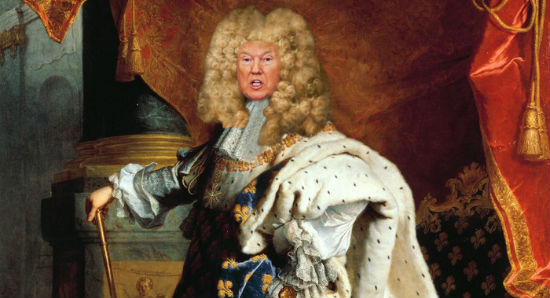Donald Trump says, proudly, that he is a nationalist. As with most words Trump uses, it is not clear that he knows what he means by this, or if he means anything like what other people mean when they use that word. And as with everything Donald Trump says, it is unclear whether or not he meant this, or actually believes it, or whether he will say the same thing again or its opposite in the next sentence.
But given all of that, Trump said this:
You know, they have a word – it’s sort of became old-fashioned – it’s called a nationalist. And I say, really, we’re not supposed to use that word. You know what I am? I’m a nationalist, okay? I’m a nationalist. Nationalist. Nothing wrong. Use that word. Use that word.
The USA Today piece linked above goes on to quote from conservative writer Max Boot, who explains the associations that lead most American politicians to avoid that word:
In the 20th century, nationalism has come to be associated with far-right politics, with fascism, with leaders like Mussolini, Hitler, Pinochet, Franco and others. And that is perhaps part of the reason why previous American presidents did not describe themselves as nationalists. They called themselves patriots.
The distinction there between “nationalists” and “patriots” goes way back. “Nationalism is not to be confused with patriotism,” George Orwell wrote in his 1945 essay “Notes on Nationalism“:
Both words are normally used in so vague a way that any definition is liable to be challenged, but one must draw a distinction between them, since two different and even opposing ideas are involved. By “patriotism” I mean devotion to a particular place and a particular way of life, which one believes to be the best in the world but has no wish to force on other people. Patriotism is of its nature defensive, both militarily and culturally. Nationalism, on the other hand, is inseparable from the desire for power. The abiding purpose of every nationalist is to secure more power and more prestige, not for himself but for the nation or other unit in which he has chosen to sink his own individuality.
Re-reading Orwell’s essay, I’m convinced that Donald Trump is, in fact, not a nationalist. I say this for the same reason that Orwell italicized that same word — not — in the quote above. A “nationalist,” in Orwell’s taxonomy, is a person who has subsumed their self and their identity into that of “the nation or other unit.” Trump doesn’t do that. He’s trying, rather, to the opposite of that — to subsume the nation into his self and his identity.
Trump shares the nationalist’s overriding obsession with pursuing power and prestige, but he seeks these for himself, not for any larger nation or cause. He is certainly preaching nationalism and promoting a political message that appeals to nationalists, but he is not himself one of them. He is, rather, a demagogue who views actual nationalists as easy marks for his own personal pursuit of personal power and prestige.
Trump’s appeal for the nationalists who adore him is due, in part, to his close kinship to their monomaniacal outlook. Here’s more from Orwell. Notice how much of it applies perfectly to Donald Trump, and the one key place where he departs from the description:
A nationalist is one who thinks solely, or mainly, in terms of competitive prestige. He may be a positive or a negative nationalist — that is, he may use his mental energy either in boosting or in denigrating — but at any rate his thoughts always turn on victories, defeats, triumphs and humiliations. He sees history, especially contemporary history, as the endless rise and decline of great power units, and every event that happens seems to him a demonstration that his own side is on the upgrade and some hated rival is on the downgrade. But finally, it is important not to confuse nationalism with mere worship of success. The nationalist does not go on the principle of simply ganging up with the strongest side. On the contrary, having picked his side, he persuades himself that it is the strongest, and is able to stick to his belief even when the facts are overwhelmingly against him. Nationalism is power-hunger tempered by self-deception. Every nationalist is capable of the most flagrant dishonesty, but he is also — since he is conscious of serving something bigger than himself — unshakeably certain of being in the right.
Donald Trump wasn’t even born yet when Orwell wrote that paragraph, yet it describes Trump to a T. Except for one little bit there, that em-dash parenthetical in the final sentence:
Trump thinks solely, or mainly, in terms of competitive prestige. Trump may use his mental energy either in boosting or in denigrating — but his thoughts always turn on victories, defeats, triumphs and humiliations. Every event that happens seems to him a demonstration that his own side is on the upgrade and some hated rival is on the downgrade. Trump might appear, at first, to be merely a worshipper of success, but rather persuades himself that everything he does succeeds, and is able to stick to his belief even when the facts are overwhelmingly against him. Donald Trump is power-hunger tempered by self-deception. He is capable of the most flagrant dishonesty, but he is also unshakeably certain of being in the right.
But — and here is what separates him from nationalists — Donald Trump has never been conscious of serving something bigger than himself. Donald Trump does not believe or accept that there is anything bigger than himself.

Given that, I agree with Dave Roberts, who observes that Trump is simply a toxic narcissist:
Trump continues to be quite easy to understand, indeed virtually transparent: he’s a toxic narcissist. It explains everything from day one. We’re just so profoundly unfamiliar with that personality ending up in that role, it shocks people over and over and over again.
But, like, of course his only lens into the election is who supported him and who didn’t, or what the results say about him. Of course his only lens into media is who praises him and who doesn’t. Of course his only lens into politics and policymaking is whether they make him look good.
And the next thing? No matter how serious it is, whether a school shooting or a potential war, he will, I promise you, treat it exactly the same way. It will be about him: what it says about him, how it makes him look, who’s with him or against him.
The shock comes from our implicit belief (based on interacting with normal people) that there’s another level, that there’s some subject, some set of events, that could jolt Trump out of his myopia and cause him to grapple with the actual weight/significance of the moment. But there isn’t. Not disease, not war, nothing. The point is he’s incapable of another level. That’s what toxic narcissism means! There is nothing exogenous that can or will change that about him. What you see is what you get, and will get, as long as he’s in power.
Trump depends on nationalists for support because he and they share a similar epistemology.
Orwell is particularly sharp in describing the “indifference to reality” that shapes the way both nationalists and narcissists view the world:
In nationalist thought there are facts which are both true and untrue, known and unknown. A known fact may be so unbearable that it is habitually pushed aside and not allowed to enter into logical processes, or on the other hand it may enter into every calculation and yet never be admitted as a fact, even in one’s own mind.
Every nationalist is haunted by the belief that the past can be altered. He spends part of his time in a fantasy world in which things happen as they should — in which, for example, the Spanish Armada was a success or the Russian Revolution was crushed in 1918 — and he will transfer fragments of this world to the history books whenever possible. Much of the propagandist writing of our time amounts to plain forgery. Material facts are suppressed, dates altered, quotations removed from their context and doctored so as to change their meaning. Events which it is felt ought not to have happened are left unmentioned and ultimately denied. … The primary aim of propaganda is, of course, to influence contemporary opinion, but those who rewrite history do probably believe with part of their minds that they are actually thrusting facts into the past. When one considers the elaborate forgeries … it is difficult to feel that the people responsible are merely lying. More probably they feel that their own version was what happened in the sight of God, and that one is justified in rearranging the records accordingly.
Indifference to objective truth is encouraged by the sealing-off of one part of the world from another, which makes it harder and harder to discover what is actually happening. There can often be a genuine doubt about the most enormous events. For example, it is impossible to calculate within millions, perhaps even tens of millions, the number of deaths caused by the present war. The calamities that are constantly being reported — battles, massacres, famines, revolutions — tend to inspire in the average person a feeling of unreality. One has no way of verifying the facts, one is not even fully certain that they have happened, and one is always presented with totally different interpretations from different sources. … The general uncertainty as to what is really happening makes it easier to cling to lunatic beliefs. Since nothing is ever quite proved or disproved, the most unmistakable fact can be impudently denied. Moreover, although endlessly brooding on power, victory, defeat, revenge, the nationalist is often somewhat uninterested in what happens in the real world. What he wants is to feel that his own unit is getting the better of some other unit, and he can more easily do this by scoring off an adversary than by examining the facts to see whether they support him. All nationalist controversy is at the debating-society level. It is always entirely inconclusive, since each contestant invariably believes himself to have won the victory. Some nationalists are not far from schizophrenia, living quite happily amid dreams of power and conquest which have no connection with the physical world.
The question, I suppose, is whether the millions of defiantly indifferent-to-reality nationalists who now support Donald Trump will one day come to see that he does not share their obsessive concern for “serving something bigger.” Perhaps they will. Perhaps it will slowly dawn on them that Trump loves only Trump and serves only Trump, and that he in no way shares their weaponized devotion to an abstract notion of “the nation.”
But that seems less likely to me than the other possibility, which is that Trump will gradually win them over to his way of thinking — weaning them away from devotion to “the nation” and transferring that devotion to “some other unit,” i.e., to himself. This seems already to have begun, at least among the most fervent nominal “nationalists” who gather at Trump’s rallies. For these devoted followers, Trump is the nation and the nation is Trump.
This seems like the more dangerous outcome. Nationalism is bad. Trumpism is worse.












